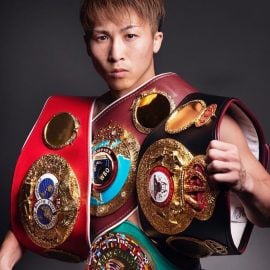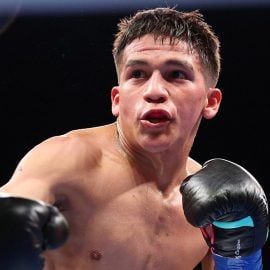Best I faced: Mike Ayala

Mike Ayala was involved in boxing from as far back as he can remember.
He enjoyed a successful amateur career and went on to become a good professional but was unable to claim a world title in three attempts.
Ayala, who was the oldest of four brothers, was born in San Antonio, Texas on January 19, 1958.
“I grew up in the west side of San Antonio, which was heavily Hispanic,” Ayala told The Ring. “It was rough but that was life.”
His father, Tony Sr., who was a Marine and served in Korea, was a big boxing fan and introduced Mike to boxing when he was 4-years-old.
“My father wanted to be a fighter but it didn’t work out for him,” explained Ayala. “He was in his 30s and too old. He would take us with the gym with him and he would train and spar and one of the coaches, Joe Montana, told him, ‘Why are you wasting your time? You should concentrate on your boys.’
“Before I could tie my shoes, I was wearing boxing gloves. I didn’t choose boxing, boxing chose me. My future was already pre-ordinated when I was born. I really didn’t have a choice. Boxing was my life and my brother’s lives. It was 24/7.”
Ayala Sr. heeded the advice and all four of his sons, Mike, Sam, Tony Jr. and Paul, boxed as amateurs and pros with different degrees of success. Tony Jr. was highly touted but life outside boxing meant he never fulfilled his potential and spent 16-years in prison for sexual assault.
“It was devastating how it played out,” Ayala said of how his infamous younger brother’s life and career went. “A lot of regret, it hurt but that’s life, you have to take the good with the bad.
“Tony was excellent, he was very talented. He was in the same weight with Ray Leonard, Tommy Hearns and Roberto Duran. He was in line for that, he just got derailed.”
Mike went on to win the 1973 Golden Gloves at flyweight, 1974 AAU championships at bantamweight and the 1975 Golden Gloves also at bantamweight in a productive amateur career.
Ayala, who went 173-4 in the unpaid ranks, elected to turn professional at 17, while still in high school. He stopped fellow debutant Raul Casares in one round, making $200, in August 1975.
The San Antonio resident won his first 12 outings before claiming the NABF junior featherweight title by stopping the experienced Mexican Cesar Deciga in seven rounds in January 1977.
It was ballsy to move so quickly, but it was a calculated risk according to Ayala: “My father had confidence in me. Things worked out for me.”
He built on that momentum with a successful defense against former bantamweight titleholder Romeo Anaya (TKO 6). However, things were getting too much for Ayala behind the scenes and he lost his regional title to another former bantamweight titlist Rodolfo Martinez in front of his home fans in May 1977.
“I was still in high school,” he said. “I just got married, I was a young boy and was having issues with conditioning and growing up. I was a boy, he was a man.
“I had a battle with drug addiction in the late 70s. I didn’t go to rehab, I did it myself. My drug was heroine, and after that, drinking.”
However, that didn’t deter Ayala, who rebounded with several wins over the next couple of years, notably scoring stoppages over former world title challengers Ronnie McGarvey (TKO 1) and Shig Fukuyama (TKO 6). Those wins helped him right the ship and earned him a WBC featherweight title shot against the excellent Danny Lopez in June 1979.

The Ayala family- Tony Sr. (center) with Mike, Sam, Tony Jr. and Paul
“I had a lot of pressure fighting in San Antonio for a world title, there was a lot of emotion,” he recalled. “It was a good fight. It was tit-for-tat, it was a war. Going into the fight I was overtrained, that’s why I lay on the ropes to conserve energy. The battle-plan was to counter-punch, he was slow. I went into the fight with a broken nose. I still went 15-rounds.
“It was heart-breaking to me [to be stopped in the 15th Round.] It was devastating to me, I knew I was the better fighter, that’s the sad thing about it. I can rant and rave but the outcome was totally different. It was just not meant to be.”
The titanic battle would later earn them The Ring Magazine’s Fight of The Year award.
Ayala relocated to New York and began working Gerry Cooney’s manager Dennis Rappaport. He stayed active over the next few years and was able to regain his NABF 122-pound title. That helped position Ayala for a second world title shot.
That shot came when he faced big-punching WBC junior featherweight titlist Juan Meza on the undercard of Julio Cesar Chavez-Ruben Castillo at the Forum, Inglewood in April 1985.
“I’ll be very candid with you; I froze, waited all my life and I went in there and laid an egg,” he said, tinged with regret. “I couldn’t get off. It was devastating for me. I suffered a bad cut and [was stopped in Round 6,] it was a big setback for me.”
Two more defenses of his NABF title followed before he lost to future hall of famer Daniel Zaragoza (KO 7) in December 1987.
“I was getting older and I was losing my edge,” he openly admitted. “I had two little girls; I’d been fighting all my life and I was worried who would take care of my girls [if something happened to me.] The pressure was getting to me. All I’d done all my life was box and the question was what was I going to do after boxing and that was laying on me heavily with the family.”
Even when he felt the end of his boxing career was in sight, he fought on, winning three fights and landed a shot at WBA 122-pound titlist Louie Espinoza, in San Antonio in August 1987.
“It wasn’t meant to be,” said Ayala, who was stopped in nine-rounds. “I had lost my edge. It was very sad.
“He was too big. He was bigger and stronger than me. He was a good fighter. He caught me with a good body-punch, it hurt me and I couldn’t beat the count [and was stopped in nine-rounds.]”
Ayala fought sparingly over the next couple of years before bowing out, of course, in San Antonio with a win over seasoned journeyman Lee Cargle (UD 10) in April 1991.
Unfortunately, Ayala was never able to get over the hump in three world title attempts.
“I feel bad, I blame myself, there’s things I should have done differently which I didn’t,” said Ayala, who retired with a record of (45-6, 23 knockouts). “The good thing is I found my way, things worked out for me, my life is good. I have a good job.”
In retirement from boxing, Ayala began civilian life, working in air conditioning. He is self-employed and still works today and includes Texas State University amongst his clients.
Ayala, now 66, is married, has five children, two grandchildren and still lives in San Antonio and stays involved in boxing training young amateurs at his local club.
He graciously took time to speak to The Ring about the best he fought in 10 key categories.
BEST JAB
Louie Espinoza: “(The jab) was strong and powerful; it was like a spear.”
BEST DEFENSE
Julian Solis: “The ex-bantamweight champion, he was pretty elusive, he was pretty slick, he had good defense. I pressured him and worked the body and he eventually started tiring.”
BEST HANDSPEED
Espinoza: “Solis and Espinoza. Of the two, I would give it to Espinoza. He was quick.”
BEST FOOTWORK
Reynaldo Hidalgo: “Panamanian guy, Reynaldo Hidalgo, he was pretty quick and he had good footwork, he went from side-to-side and gave me a lot of angles.”
SMARTEST
Rodolfo Martinez: “He was pretty smart. He was a switch-hitter and he would sometimes switch from left-handed to right-handed. I was trying to do something and he would change [it was difficult] to get a read on him.”
STRONGEST
Espinoza: “I was trying to get inside and one time he literally picked me up and threw me across the ring. He was strong.”
BEST PUNCHER
Juan Meza: “I was stopped but I was never knocked out. With Lopez, I had a broken nose and I went to the 15th round and I was exhausted. Juan Meza was a hard-puncher. When he hit you, you knew you’d been hit, he was heavy-handed.”
BEST CHIN
Danny Lopez: “I hit that guy with a lot of good, clean shots. He took a lot of shots and after that he wasn’t the same.”
BEST BOXING SKILLS
Daniel Zaragoza: “Julian Solis could box pretty good. Daniel Zaragoza was a good boxer; I would give it to him. He was boxing and staying on the outside.”
BEST OVERALL
Lopez: “I fought a lot of good fighters, it’s hard to say. I would say “Little Red” Lopez, it was his persistence, his ability to take a shot, he could hit good and he had a lot of experience.”
Questions and/or comments can be sent to Anson at [email protected].














